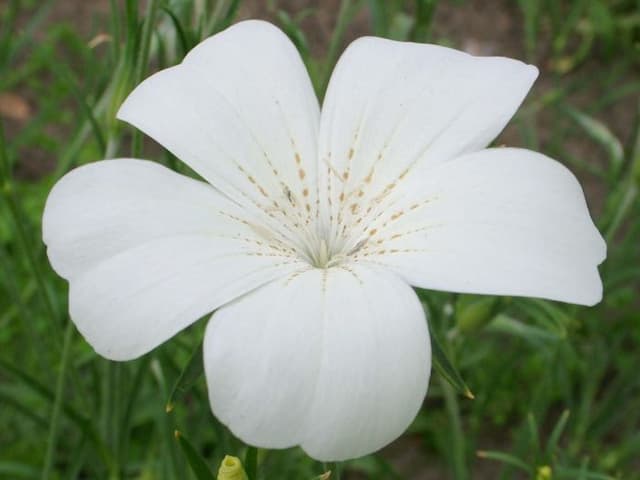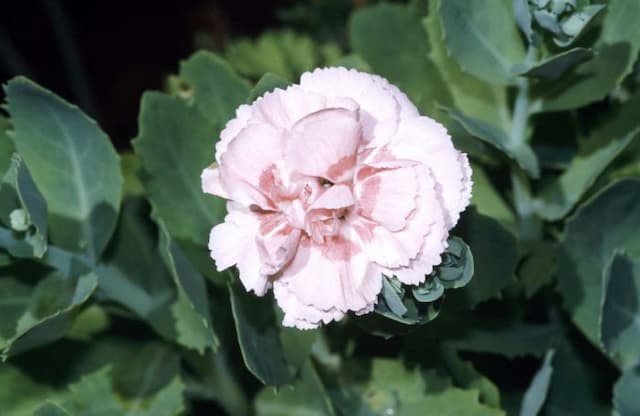Pink Dianthus 'Dunkirk Spirit' (pf)

ABOUT
Dianthus 'Dunkirk Spirit' is a vibrant perennial plant known for its striking flowers and lush foliage. The flowers are notable for their rich, velvety red petals which typically have a ruffled or fringed edge, giving them a full, textured appearance. Each blossom is distinguished by a deeper crimson eye or center, which adds depth and contrast to the flower's overall look. These blooms emit a sweet and spicy fragrance that can be quite delightful and enticing. The leaves of the 'Dunkirk Spirit' are slender and bluish-green, forming a dense mound beneath the flowers. The foliage offers a nice backdrop to the vivid blooms, thus enhancing their appeal. The plant has a tidy and compact growth habit, producing a neat and attractive clump. With their bold color and pleasing scent, the Dianthus 'Dunkirk Spirit' is a popular choice for adding a splash of color and charm to garden borders, containers, and as cut flowers to bring their beauty indoors.
About this plant
 Names
NamesFamily
Caryophyllaceae
Synonyms
Dunkirk Spirit Dianthus, Dunkirk Spirit Pink, Dunkirk Spirit Carnation
Common names
Dianthus 'Dunkirk Spirit'
 Toxicity
ToxicityTo humans
The common name for Dianthus 'Dunkirk Spirit' is Pinks. Generally, Pinks are not considered toxic to humans. However, as with any plant, individual sensitivities can vary, so it is always advisable to avoid ingesting plant material that is not typically recognized as food. If a person were to ingest a significant amount of Pinks, the greatest risk might be gastrointestinal discomfort such as nausea, vomiting, or diarrhea due to the unusual plant material in the digestive system. If any adverse effects are noticed after ingesting parts of the plant, it is recommended to seek medical attention.
To pets
The common name for Dianthus 'Dunkirk Spirit' is Pinks. Pinks are not known to be toxic to pets, including dogs and cats. These flowers are generally considered safe if pets happen to ingest them. However, as with humans, individual animals might have sensitivities or allergies to plant materials that could cause mild gastrointestinal upset, such as mild vomiting or diarrhea. It is always best practice to monitor your pets when they are around plants and to discourage them from consuming any non-food plants. If your pet shows signs of distress after ingesting part of the plant, consult with your veterinarian.
 Characteristics
CharacteristicsLife cycle
Perennials
Foliage type
Evergreen
Color of leaves
Blue-green
Flower color
Pink
Height
1 feet 11-12 inches [30-35 cm]
Spread
1 feet [30 cm]
Plant type
Herb
Hardiness zones
Varies
Native area
Europe
Benefits
 General Benefits
General Benefits- Attractive Flowers: The Dunkirk Spirit produces vibrant, eye-catching flowers that can add a splash of color to gardens and landscapes.
- Fragrance: This plant is known for its delightful scent, which adds an aromatic aspect to any garden setting.
- Ease of Care: Dunkirk Spirit is generally easy to maintain, as it doesn't have very demanding care requirements.
- Drought Tolerance: Once established, it has a good tolerance for drought conditions, making it suitable for gardens in dryer climates.
- Long Blooming Season: It provides a long flowering season, often from late spring to early fall, offering extended periods of visual interest.
- Attracts Pollinators: The flowers attract bees and butterflies, which are beneficial for pollination in the garden.
- Rabbit Resistant: The plant is known to be fairly resistant to rabbits, reducing the likelihood of damage from these creatures.
- Versatility: The Dunkirk Spirit can be used in a variety of garden settings, including borders, containers, and as cut flowers for arrangements.
- Compact Size: It is relatively compact, making it appropriate for small garden spaces or for growing in pots.
- Deer Resistance: The plant tends to be less attractive to deer than many other garden plants, reducing the risk of deer-related damage.
 Medical Properties
Medical PropertiesThis plant is not used for medical purposes.
 Air-purifying Qualities
Air-purifying QualitiesThis plant is not specifically known for air purifying qualities.
 Other Uses
Other Uses- Flower Arrangement Filler: The Dianthus 'Dunkirk Spirit', commonly known as the Carnation, can be used in flower arrangements, providing texture and volume to bouquets due to its dense clusters of frilly, fragrant flowers.
- Edible Decor: The petals of Carnations are edible and can be used to garnish salads, desserts, and cocktails, adding a splash of color and a mild spicy flavor.
- Homemade Potpourri: Dried Carnation petals can be included in homemade potpourri mixes, contributing a pleasant fragrance that lasts for months when stored properly.
- Natural Dye: The petals of Carnations can be used to create natural dyes for fabrics or papers, offering hues ranging from pale pinks to deep reds depending on the concentration and mordant used.
- Bookmark Creation: Pressed Carnation petals can be laminated onto paper or cardstock to create beautiful, botanical-themed bookmarks.
- Essential Oils: Although not as common, Carnation flowers can be processed to extract essential oils that are sometimes used in perfumery and aromatherapy for their sweet, spicy scent.
- Bath Additive: Fresh or dried Carnation petals can be added to bathwater for a relaxing, aromatherapy experience and to impart a mild fragrance to the skin.
- Candle Embeds: Small Carnation flowers or petals can be embedded into the wax of homemade candles, giving the candles an attractive appearance and subtle fragrance when burned.
- Soap Embellishments: Carnation petals can be mixed into soap batches during the crafting process, adding an organic touch and light scent to the finished soap bars.
- Artistic Inspiration: The striking colors and patterns of Carnation blooms can serve as inspiration for artists and designers, being used as subjects in paintings, textile patterns, and interior decor themes.
Interesting Facts
 Feng Shui
Feng ShuiThe plant Dianthus is not used in Feng Shui practice.
 Zodiac Sign Compitability
Zodiac Sign CompitabilityThe plant Dianthus is not used in astrology practice.
 Plant Symbolism
Plant Symbolism- Devotion - Dianthus flowers often symbolize devotion due to their long-lasting nature and the way they bloom with vigor.
- Dignity - The 'Dunkirk Spirit' variety, in particular, can be associated with dignity, reflecting the courage and steadfastness associated with the Dunkirk evacuation in World War II.
- Love - With their rich fragrance and striking patterns, Dianthus flowers are commonly associated with romantic love.
 Water
WaterFor the Carnation 'Dunkirk Spirit', it is essential to maintain consistently moist soil without over-saturating it. Water the plant thoroughly, ensuring that you’re wetting the soil and not just the surface. Aim to provide about 1 to 1.5 inches of water per week, depending on the weather conditions—less if it's raining regularly and more during particularly hot, dry periods. It's best to water early in the morning to allow any moisture on the foliage to evaporate and to reduce the risk of disease. Be sure to adjust your watering schedule based on the plant's response, soil type, and climate variability.
 Light
LightCarnations like 'Dunkirk Spirit' thrive in full sunlight, receiving at least 6 hours of direct sunlight a day. The best spot for these plants is in an area where they can bask in the early morning light, which is less intense and helps the foliage dry out from the overnight dew. They can tolerate partial shade, but flowering is maximized with ample sunlight. Therefore, plant them in a bright location with good exposure to the sun for optimal growth and blooming.
 Temperature
TemperatureCarnations such as the 'Dunkirk Spirit' prefer a temperature range between 50 to 70°F, which is ideal for their growth and blooming cycle. They can survive temperatures down to about 40°F but should be protected from frost. During hot weather, especially when temperatures exceed 80°F, it's important to ensure these flowers have adequate moisture and some protection from intense afternoon heat to prevent stress.
 Pruning
PruningPrune Carnation 'Dunkirk Spirit' to encourage bushiness and to remove spent flowers, which promotes further blooming. Deadheading, or the removal of faded flowers, should be done regularly throughout the blooming season. The best time for more extensive pruning is in early spring when plants are emerging from dormancy. Cut back the stems to about one-third of their height to help keep the plant compact and encourage new growth.
 Cleaning
CleaningAs needed
 Soil
SoilCarnations prefer well-draining, loamy soil with a neutral to slightly alkaline pH, typically between 6.7 and 7.5. The best soil mix can be achieved by combining two parts loam, one part sand or perlite, and one part compost to ensure fertility and drainage.
 Repotting
RepottingCarnations generally need to be repotted every 2-3 years, as they do not have a rapid growth rate. When the plant shows signs of becoming root-bound or when the soil is depleted, it is time to repot.
 Humidity & Misting
Humidity & MistingCarnations thrive in environments with average humidity levels. They do not require high humidity; maintaining indoor levels between 40-60% is usually adequate for their growth.
 Suitable locations
Suitable locationsIndoor
Place carnations in a sunny spot, water sparingly.
Outdoor
Ensure full sun, shelter from strong winds, and well-draining soil.
Hardiness zone
3-9 USDA.
 Life cycle
Life cycleDianthus 'Dunkirk Spirit', commonly known as Pink, begins its life cycle as a seed, requiring well-draining soil and full to partial sun exposure for germination. Upon sprouting, the seedling grows into a rosette of leaves at the base, and as it matures, it develops sturdy stems. This perennial plant experiences vegetative growth, forming a clump of grassy, blue-green foliage. The Dunkirk Spirit Pink produces its signature fragrant flowers during the spring to early summer, and if deadheaded, it may rebloom in early fall. After blooming, the plant goes into a period of dormancy during the winter months, where it conserves energy. In subsequent years, the plant reemerges from its root system, repeating the flowering process and potentially producing new seeds to disperse, allowing the cycle to continue.
 Propogation
PropogationPropogation time
Late spring to early summer
Dianthus 'Dunkirk Spirit', commonly known as Pink, is typically propagated through cuttings to preserve the characteristics of the cultivar. The ideal time for taking cuttings is late spring to early summer when the plant is actively growing. To propagate by cuttings, a gardener selects a healthy, non-flowering shoot and makes a cut just below a node, creating a cutting of about 3-4 inches (approximately 7.5-10 centimeters). The lower leaves are removed, and the cut end may be dipped in rooting hormone before planting in a well-draining soil mix. It's important to maintain humidity around the cutting until roots have formed, often by placing it in a covered environment like a clear plastic bag or a propagator. The cutting should be kept in indirect sunlight and should not be allowed to dry out. After a few weeks, when the cutting has developed its own root system, it can be transplanted to a permanent location.








![Pink [Bubblegum]](/_next/image?url=https%3A%2F%2Fplants-admin.emdemapps.com%2Fimages%2Fplants%2F%2Fimages%2F604b596f31cbb.png&w=640&q=75)
